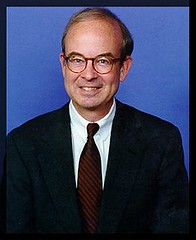I know this is a big shock, but the
AP published a misleading story. Sadly, it's been printed by (among others) the Washington Post, Seattle Post Intelligencer, and SF Chronicle. In it, Jennifer Kerr blares:
The overriding answer from the two panels representing the recording industry, copyright experts and entrepreneurs was "no [new legislation needed]"--at least in the short term.
This is just not true. At least one witness--the
Register of Copyrights,
Marybeth Peters--believes that Grokster reveals a huge need for new legislation. Due to the arcane nature of statutory licensing, digital and terrestrial radio stations alike can play whatever they want and pay a legally defined royalty to central rights clearinghouses, but online music vendors have to negotiate for the rights to each and every track.
This creates holes big enough to drive a truck through. See
my last post on this.
Here, in detail, is Peters' reasoning:
Although the Grokster decision contributed immensely to the world of legitimate online music distribution, it did not, and could not, resolve all of the difficulties facing this industry. One area which poses the most hurdles to efficient and affordable distribution is the process of licensing the underlying musical works. Because this process is constrained by practical and statutory antiquities, it creates an incentive and opportunity for piracy to flourish. I commend you for considering the necessity of legislation in the wake of Grokster, and I would suggest that the one topic on which legislation should be presently considered is the reform of the process for licensing online distribution of musical works.
Of course, Kerr misses this subtle detail. Wholly out of context, she quotes Peters' recommendation to let stand the specific question of the Grokster decision itself. Grokster only settled the applicability of the standard for contributory and vicarious infringement to P2P services, and Kerr leaves readers with the impression that Peters is a-OK with the entire copyright status quo.
Bunk reporting by a bunk news service, I say. My letter to the editor, however, leaves that allegation between the lines. I hope the Post decides to publish it.
When Peters--who is very regularly on the side of copyright holders--insists that we need reform, Congress and the public should listen.

